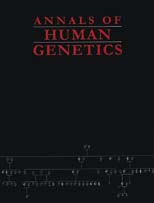Article contents
Phenylketonuria – a problem in eugenics
Published online by Cambridge University Press: 01 May 1998
Abstract
Inaugural Lecture delivered at University College on 21 Jan. 1946 and reprinted with permission from The Lancet, 29 June 1946, pp. 949–953
For academic purposes, eugenics is defined as the study of agencies under social control that may improve or impair the racial qualities of future generations either physically or mentally. This formula allows many different interpretations. The subject matter might involve almost any material studied in medicine, psychology or social science. In the light of knowledge of its frequent misuse, inclusion of the term “racial” in the definition seems unfortunate. A racial quality is presumably any character which differs in frequency or which (when it is metrical) differs in average value in two or more large groups of people. No qualities have been found to occur in every member of one race and in no member of another. Furthermore, as Morant (1939) has shown in his analysis of European populations, differences between average measurements in the so-called races are often much smaller than commonly supposed. The qualities by which people differ can be treated as legitimate material for scientific investigation without employing any invidious concept of race. The human race constitutes the field of eugenic inquiry.
A popular view of eugenics, which has in the past been encouraged by propaganda groups such as eugenic societies and human betterment foundations, implies active interference in human reproduction. The general grounds for interference are often held to be that civilisation has tended to reverse the process of natural selection because the weaklings are now being fostered at the expense of the naturally strong. Not only are the physically and mentally inferior prevented from perishing in infancy by the activities of medical and social services but also, when the weaklings grow up, they are supposed to be more fertile than the normal. As Karl Pearson (1909) once put it, “we have suspended the racial purgation maintained in the less developed communities by natural selection.” Degeneration of the physical and mental level of civilised peoples is believed to be inevitable unless eugenic measures are taken to counteract it.
- Type
- Research Article
- Information
- Copyright
- © University College London 1998
- 8
- Cited by


